|
|
|
Sort Order |
|
|
|
Items / Page
|
|
|
|
|
|
|
| Srl | Item |
| 1 |
ID:
183018
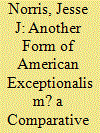

|
|
|
|
|
| Summary/Abstract |
Sting operations can potentially thwart terrorist plots, but could also threaten civil liberties and alienate communities, making them a critical subject for counterterrorism research. Yet despite considerable research on U.S. cases, little is known about terrorism stings elsewhere. How common are such cases abroad, and how many feature strong entrapment claims or result in entrapment-related acquittals? In this study, data are gathered about non-U.S. terrorism stings, each of which is evaluated for entrapment indicators. Results show that, contrary to claims of American exceptionalism, terrorism stings could be identified in twenty-one countries, and the average number of entrapment indicators per case is similar between the U.S. and several countries. In addition, several non-U.S. cases present entrapment claims as strong as some of the most-criticized U.S. cases. However, relatively few non-U.S. terrorism stings (fifty-one) could be identified, while there are 156 U.S. cases. In addition, unlike in the U.S., courts have acquitted defendants on entrapment grounds in a high proportion of non-U.S. cases. Political, cultural, and legal differences between the U.S. and other countries, and certain cross-national commonalities, are identified as likely accounting for these results. Potential implications of these findings for terrorism prevention and legal reform are considered.
|
|
|
|
|
|
|
|
|
|
|
|
|
|
|
|
| 2 |
ID:
116224
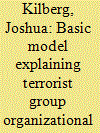

|
|
|
|
|
| Publication |
2012.
|
| Summary/Abstract |
Terrorist groups strive to balance efficiency with their need for security. This article examines the factors that affect a group's choice of organizational structure. I classify 254 groups from the Global Terrorism Database into one of four basic structures: market, all-channel, hub-spoke, or bureaucracy. The results of a multinomial logistic regression reveal that as secret organizations, terrorist groups are not just driven by achieving efficiencies in their organization but rather by protecting against infiltration and threats. Internal factors such as target selection, operational pace, ideology, and stated goals shape a group's structure. External environmental factors such as political rights, civil liberties, polity durability, and state wealth also help shape a group's structure.
|
|
|
|
|
|
|
|
|
|
|
|
|
|
|
|
| 3 |
ID:
103302
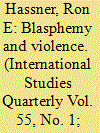

|
|
|
|
|
| Publication |
2011.
|
| Summary/Abstract |
Why did riots in response to the 2005 Danish cartoons depicting the Prophet Muhammad occur in nine Muslim states but not in 43 other states in which Muslims form a majority of the population? I show that the location of the cartoon riots is best explained by combining insights from the study of politics with arguments from the sociology of religion. Protests were mobilized by radical Islamist movements alarmed by the moral threat posed by the blasphemous cartoons. In states characterized by political rights and civil liberties, regimes responded haphazardly to the demonstrations, leading to confrontations between security forces and angry rioters. This finding can be generalized beyond the Muslim world: We should expect reactive religious violence wherever fundamentalist movements are confronted by transgressive acts, committed by threatening opponents, in a political environment that permits protest but fails to protect the religious principles of the movement.
|
|
|
|
|
|
|
|
|
|
|
|
|
|
|
|
| 4 |
ID:
081561
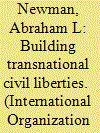

|
|
|
|
|
| Publication |
2008.
|
| Summary/Abstract |
Democratic nations have long struggled to set the proper balance between individual freedom and government control. The rise of digital communications networks, market integration, and international terrorism has transformed many national civil liberties issues into important international debates. The European Union was among the first jurisdictions to manage these new transnational civil liberties with the adoption of a data privacy directive in 1995. The directive substantially expanded privacy protection within Europe and had far-reaching consequences internationally. While international relations scholars have paid considerable attention to the global ramifications of these rules, research has not yet explained the origins of the European data privacy directive. Given the resistance from the European Commission, powerful member states, and industry to their introduction, the adoption of supranational rules presents a striking empirical puzzle. This article conducts a structured evaluation of conventional approaches to European integration-liberal intergovernmentalism and neofunctionalism-against the historical record and uncovers an alternative driver: transgovernmental actors. These transgovernmental actors are endowed with power resources-expertise, delegated political authority, and network ties-that they employ to promote their regional policy goals. This article uses the historical narrative of the data privacy directive to explain the origins of a critical piece of international civil liberties legislation and to advance a theoretical discussion about the role of transgovernmental actors as policy entrepreneurs within the multilevel structure of the European Union
|
|
|
|
|
|
|
|
|
|
|
|
|
|
|
|
| 5 |
ID:
121990
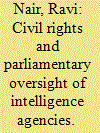

|
|
|
| 6 |
ID:
154813
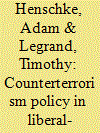

|
|
|
|
|
| Summary/Abstract |
This article considers the moral limits to national security policies. While it may seem self-evident that there are, and ought to be, limits to counterterrorism policies, there is an increasingly widespread public opinion that political leaders can, and must, do everything they can to protect against terrorist acts. Liberal-democratic societies are facing the threat of domestic terrorism, and for a political leader to say that ‘we cannot stop all terrorist acts and, indeed, neither should we’ would sound the death knell for their career. This article seeks to specify the limiting conditions around counterterrorism policy by reference to policymakers’ public justifications offered for counterterrorism policy. This article presents three normative elements that underpin counterterrorism policy to show that there are important reasons to limit counterterrorism policy, and to suggest that these limits ought to be recognised by political leaders and citizens alike in liberal-democratic societies. Having set out three limiting factors on counterterrorism policy, the article then shows that these factors do indeed play a role in UK counterterrorism policy development—that is, in recognising the justificatory apparatus for national security policies, limiting conditions ought to be found that are sensible to, and accepted by, the proponents of such policies.
|
|
|
|
|
|
|
|
|
|
|
|
|
|
|
|
| 7 |
ID:
160130
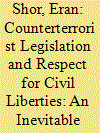

|
|
|
|
|
| Summary/Abstract |
The literature on counterterrorist measures often emphasizes the potential harmful effects of such measures on human rights and civil liberties. While recent research has examined the effects of counterterrorist legislation on the violation of physical integrity rights (e.g., torture and extrajudicial killings), no quantitative cross-national study has looked at the consequences for civil liberties. Still, case studies in a variety of countries suggest that counterterrorist legislation indeed leads to various infringements of liberties such as the freedoms of expression, religion, assembly, and movement. We conduct a cross-national time series analysis of counterterrorist legislation and consequent repression of civil liberties for the years 1976–2009. We find that the effects of legislation vary by levels of initial repression. Legislation has a negative effect on respect for civil liberties in countries with moderate levels of repression. However, this effect diminishes in non-repressive countries and reverses in countries with high levels of repression.
|
|
|
|
|
|
|
|
|
|
|
|
|
|
|
|
| 8 |
ID:
121800
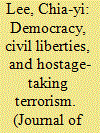

|
|
|
|
|
| Publication |
2013.
|
| Summary/Abstract |
While hostage-taking has been a common form of terrorism for decades, which types of governments are more prone to it remains unclear. Does democracy motivate terrorists to engage in hostage-taking acts because of how easy negotiating with a democratic government is? Or does democracy impose 'audience costs' on the government leaders, driving them never to negotiate with hostage-taking terrorists following the long-held principle of no negotiation? This article argues that hostage-taking terrorists are more inclined to target democratic governments because of the greater value given to human life and personal freedom in democracies. Additionally the helplessness of held hostages is more freely exposed by the media in democracies, which leads to the audience focusing on the hostages themselves rather than on the interests of the nation. This in turns compels decisionmakers to concede, especially near election time. It is only when institutional constraints on the executives are high that democratic leaders refuse to make concessions. Using data on hostage events from 1978 to 2005, this article finds strong evidence that supports this theory, showing that democracy has competing effects on hostage-taking terrorism - civil liberties and press freedom are positively associated with hostage-taking incidents, whereas executive constraints have a negative association.
|
|
|
|
|
|
|
|
|
|
|
|
|
|
|
|
| 9 |
ID:
112798
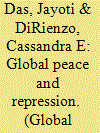

|
|
|
|
|
| Publication |
2012.
|
| Summary/Abstract |
Past research and historical events suggest that the relationship between the peacefulness of a country and the degree of political and civil liberties afforded to its citizens has an inverted U-shape relationship such that the greatest unrest is observed at an intermediate level of freedom. Using the Global Peace Index (GPI), developed by the Institute for Economics and Peace (2010) in collaboration with the Economist Intelligence Unit, this study empirically tests this relationship and the results offer support for this nonlinear relationship. It is argued that while highly repressed societies experience a 'controlled' peace, highly free societies also experience peace stemming from the basic freedoms such as the right to expression and assembly and participation in policy creation. Alternatively, when political and civil freedoms are at some intermediate level, the freedoms offered may not be strong enough to serve as a substitute for protest, yielding greater conflict, crime, and less peace. Policy implications of the findings are also offered.
|
|
|
|
|
|
|
|
|
|
|
|
|
|
|
|
| 10 |
ID:
117482
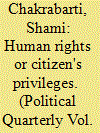

|
|
|
|
|
| Publication |
2012.
|
| Summary/Abstract |
New Labour arguably left Britain more comfortable in its diversity and better protected by anti-discrimination law. Equal treatment for gay people advanced significantly and the Human Rights Act provides a modern Bill of Rights for everyone in the Kingdom. Curiously however, parallel laws dishonoured these values in thought, word and deed. Home affairs hyperactivity left ours a less friendly country in which to seek asylum, dissent or even be young. The Coalition bound itself together with 'civil liberties' and quickly reversed some excesses of the previous decade. Last year's 'Arab Spring saw it promote human rights abroad. However the Government appears bitterly divided by them at home. Is the debate about a more 'British' Bill of Rights, political genius, pragmatic fudge or a dangerous swindle capable of depriving us all of vital protection against abuse of power?"
|
|
|
|
|
|
|
|
|
|
|
|
|
|
|
|
| 11 |
ID:
137913
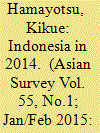

|
|
|
|
|
| Summary/Abstract |
In 2014, Indonesia inaugurated as president the former Governor of Jakarta, Joko Widodo, or ‘‘Jokowi,’’ raising public expectations for reform especially among people outside the powerful political and business elite circles. It is uncertain to what extent, and how, the new government will achieve his reform agendas. Moreover, a relatively weak economy and declining civil liberties may pose an additional challenge, despite Jokowi’s avowed commitment to structural reforms and good governance.
|
|
|
|
|
|
|
|
|
|
|
|
|
|
|
|
| 12 |
ID:
119411
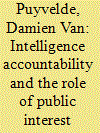

|
|
|
|
|
| Publication |
2013.
|
| Summary/Abstract |
This article explores the role of US public interest groups in the promotion of government transparency, as part of a broader agenda on civil liberties. Drawing on a set of declassified documents, and extensive oral testimony from protagonists, it is argued that such groups occupy a significant position as facilitators of intelligence accountability in the United States. Public interest groups represent a tradition of pluralism that lies at the heart of the American conception of democracy. A survey of the tactics deployed by interest groups to support liberal democratic principles demonstrates that these groups always rely on government institutions to carry out their oversight function. By virtue of this, public interest groups support intelligence accountability rather than hold to account the US government and its intelligence agencies.
|
|
|
|
|
|
|
|
|
|
|
|
|
|
|
|
| 13 |
ID:
105170
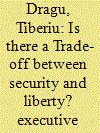

|
|
|
|
|
| Publication |
2011.
|
| Summary/Abstract |
I develop a game-theoretic model of an interaction between an antiterrorist agency and a terrorist organization to analyze how the probability of a terrorist attack varies when the level of privacy protections changes. I derive two implications. First, privacy and security from terrorism need not be in conflict: when accounting for strategic interactions, reducing privacy protections does not necessarily increase security from terrorism. Second, and more important, the antiterrorist agency will always want less privacy. The very agency whose expertise affords it disproportionate influence on policy making will prefer a reduction in privacy protections even when that reduction harms security from terrorism. The analysis has implications for understanding the relationship between government powers and civil liberties in the context of terrorism prevention and times of emergencies more generally.
|
|
|
|
|
|
|
|
|
|
|
|
|
|
|
|
| 14 |
ID:
115618
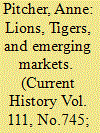

|
|
|
|
|
| Publication |
2012.
|
| Summary/Abstract |
Much of Africa's wealth is unevenly spread across the continent and tends to be concentrated in resource-rich countries with large populations.
|
|
|
|
|
|
|
|
|
|
|
|
|
|
|
|
| 15 |
ID:
119452
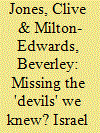

|
|
|
|
|
| Publication |
2013.
|
| Summary/Abstract |
While the immediate outcome of the Iraq War of 2003 was certainly to Israel's strategic advantage, the more immediate and indeed visceral challenge of the ongoing Al-Aqsa intifada has dominated the security horizons of most Israelis. The legacy of this conflict, with its strong Islamist overtones, has clearly had a bearing on how the Arab Awakening has come to be perceived by Israel.
Taking this experience as its starting point, this article examines the response by Tel Aviv to the Arab Awakening at an elite level and how, for the most part, Israeli perceptions of its Islamist essence, an essence that rejects popular accountability, continues to be viewed through a predominantly Realist prism. Such perceptions look set to endure, shaping Israel's immediate attitudes towards the Palestinians and the wider Arab world.
The authors argue that while Israeli concerns over the trajectory of the Arab Awakening do carry empirical weight, such concerns can be equally understood as part of a wider critique with regard to Israel's own emerging democratic deficit. This was seen most recently in a raft of legislative bills put before the Knesset between 2009 and 2012 designed to curb civil liberties in Israel; alongside its continued occupation of Palestinian lands and wider demographic shifts, such moves increasingly tarnish Israel's proud claim to be both Jewish and democratic.
|
|
|
|
|
|
|
|
|
|
|
|
|
|
|
|
| 16 |
ID:
090968
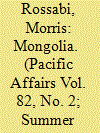

|
|
|
|
|
| Publication |
2009.
|
| Summary/Abstract |
The Mongolian People's Revolutionary Party (MPRP), founded in 1924, ruled Mongolia as a one-party communist state until 1990. Following the model of the Soviet Union, it imposed a dictatorial government which engaged in a purge leading to the deaths of about 25,000 people, undermined Buddhism, and collectivized the herds. On the other hand, it fostered industrialization and urbanization, introduced modern educational and medical systems, and provided a social safety net for the 183 population. Yet it kept Mongolia isolated from the rest of the world. The fall of communism transformed the MPRP. To hold power, it aligned itself with international financial organizations, which required acquiescence to a shock therapy of rapid privatization, liberalization of trade, elimination of price subsidies, a balanced budget and minimalist government, resulting in increased corruption, unemployment, and greater income inequality. Poverty soared, health and education suffered, and the social safety net was frayed. Market solutions, which both the international financial organizations and the MPRP championed, did not resolve these problems. To be sure, democracy and civil liberties have made great strides, and elections until the summer of 2008 were fair and free of violence. However, parlous economic conditions do not augur well for the future. The MPRP has deviated from its social message of economic democracy and equality of economic opportunity, and the 2008-2009 world-wide financial crisis has exacerbated its problems.
|
|
|
|
|
|
|
|
|
|
|
|
|
|
|
|
| 17 |
ID:
034391
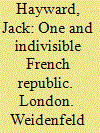

|
|
|
|
|
| Publication |
London, WeidenFeld and Nicolson, 1973.
|
| Description |
xiii, 306p.: table, figure.Hbk
|
| Standard Number |
0297765906
|
|
|
|
|
|
|
|
|
|
|
|
Copies: C:1/I:0,R:0,Q:0
Circulation
| Accession# | Call# | Current Location | Status | Policy | Location |
| 012715 | 944.083/HAY 012715 | Main | On Shelf | General | |
|
|
|
|
| 18 |
ID:
148924
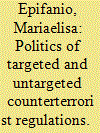

|
|
|
|
|
| Summary/Abstract |
Civil liberties came under pressure after Al Qaeda’s attacks in the U.S. and Europe. Governments in many Organisation for Economic Co-operation and Development countries started questioning the effectiveness of counterterrorist policies and regulations. Incumbents responded to terrorism not only by introducing ex novo (or re-adapting) laws and regulations affecting a large set of civil rights; they also responded to international terrorism by choosing between an untargeted and a targeted legislative response. Some governments reduced the liberties of foreign foes more than the freedoms of citizens, while others preferred burdening all individuals within their borders, immigrants and citizens alike. This article analyzes the determinants of targeted and untargeted antiterrorist responses to Al Qaeda terrorism in a sample of 20 Western democracies from 2000 to 2008. The findings suggest that patterns of targeted legislation were more pronounced in countries governed by right-wing incumbents and those where the decisional power in the cabinet is divided among a few number of political parties. In addition, a larger share of Muslims and the degree of ethnic fractionalization played a relevant role in determining governments’ choices of prime targets.
|
|
|
|
|
|
|
|
|
|
|
|
|
|
|
|
| 19 |
ID:
166857
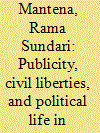

|
|
|
|
|
| Summary/Abstract |
In the 1930s, there were two glaring questions confronting the princely state of Hyderabad's Administration: the question of sovereignty (or the political future of the Hyderabad) and the problem of civil liberties. This article explores the complex socio-political conditions in the early decades of the twentieth century that gave rise to the formation of dynamic civil-society institutions in the princely state of Hyderabad. In particular, it asks how and why the discourse of civil liberties was taken up by these institutions and assesses the response of the Hyderabad Administration with respect to safeguarding civil liberties for its subjects. What the historical record reveals is that the early decades of the twentieth century in Hyderabad became a battleground between the Hyderabad Administration and the burgeoning public sphere that the Administration could not control nor manage.
|
|
|
|
|
|
|
|
|
|
|
|
|
|
|
|
| 20 |
ID:
130474
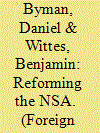

|
|
|
|
|
| Publication |
2014.
|
| Summary/Abstract |
The long-running debate over the tradeoffs the United States should make between national security and civil liberties flared up spectacularly last summer, when Edward Snowden, a National Security Agency contractor, handed journalists a huge trove of heavily classified documents that exposed, in excruciating detail, electronic surveillance programs and other operations carried out by the NSA. Americans suddenly learned that in recent years, the NSA had been acquiring the phone and Internet communications of hundreds of thousands of U.S. citizens, as well as collecting massive volumes of bulk telephone records known as "metadata" -- phone numbers and the time and length of calls. Along with the rest of the world, Americans found out that the NSA had broken common forms of online encryption, tapped the phones of various foreign heads of state, and monitored global communications far more aggressively than was previously understood.
|
|
|
|
|
|
|
|
|
|
|
|
|
|
|
|
|
|
|
|
|